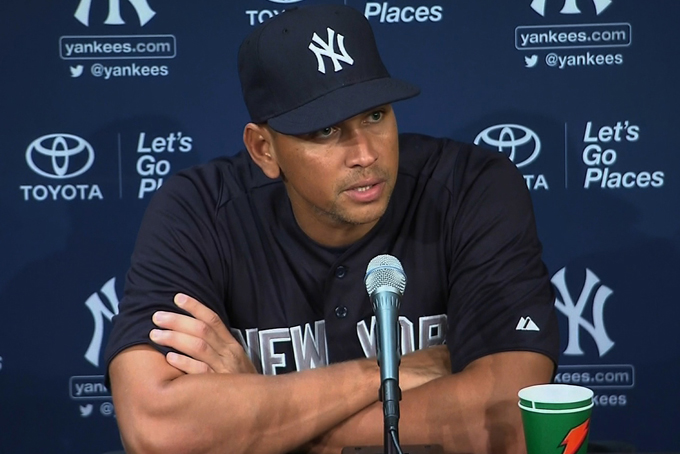
Yankee’s star Alex Rodriguez spoke at a press conference after Major League Baseball suspended him for 211 regular-season games through the 2014 season August 5. (CNN Photo)
(CNN) — “A-Rod is the future of baseball. He’s exactly what the game needs: a Dominican wonder kid with Hollywood looks, one of the best players in the game, the highest-paid deal in baseball at just 22 years-old. No question he’s our cover guy.”
That was my argument as a young editor back in March of 1998 for putting A-Rod on the premiere cover of ESPN The Magazine, along with Kobe Bryant, Eric Lindros and Kordell “Slash” Stewart (oops).
Who knew A-Rod would never live up to the hype? He would never be the superstar, stand-up guy we expected. It seemed he was never able to get out from his own ego to be a consistent clutch performer. Who knew 15 years later we’d be talking about Alex Rodriguez and Pete Rose in the same sentence, or debating whether the Yankees third baseman should be banned for life from baseball for taking performance enhancing drugs and trying to cover up his cheating? Maybe we just expected too much.
On Monday Major League Baseball agreed to 50-game suspensions for 12 players for their involvement with the south-Florida Biogenesis clinic, which allegedly supplied the athletes with performance enhancing drugs.
But it was A-Rod, the biggest star named in the cheating scandal who felt the brunt of MLB’s wrath. He was suspended for 211 games through the end of the 2014 season. If the ruling holds up, the 38-year-old player will not be allowed to return to the game until he’s 40. But, baseball rules being what they are, A-Rod will still be allowed to play, starting tonight, while he appeals his suspension.
No matter what the eventual outcome of the Rodriguez story, the never-ending saga of cheaters in what was once America’s pastime has hurt the game and alienated fans.
“Cheating makes me question the game,” says Charlie Thompson, 28, a lifelong Yankee fan. “I remember (Sammy) Sosa and (Mark) McGwire going for 60 homers when I was a kid. That was an amazing part of my childhood. And I didn’t think at any time that they were cheating. But once I found out they were using steroids it left a bad taste in my mouth. Everything is fake.”
It is a sad ending for someone with so much promise. Back in 1998, A-Rod was an American success story. And as my colleagues and I nervously launched our scrappy upstart ESPN the Magazine we celebrated him, even with his record-breaking $252 million contract over 10 years. (Increased by the Yankees in 2007 to a 10-year, $275 million deal.)
After all, it was the era of the young guns, when sports stars and rock stars took top spots in the popular culture. A-Rod fit right in with the exclusive list of elite young talents who were next in line to change the world, or at least our world.
Super Bowl champion Brett Favre was reaching for god-like status and lighting up the screen with Cameron Diaz in the hit movie “There’s Something About Mary.” Tiger Woods was on his way to global dominance with one Masters Championship. Jay-Z’s Grammy-winning “Hard Knock Life” album signaled the arrival of the hip-hop generation and was a favorite at sports arenas. Athletes across all races were all clamoring to mimic his swagger on and off the field.
So how could we hate A-Rod for making coin when everyone else seemed to be cashing in not only on sports but in life?
But like many of us, Alex Rodriguez got caught up in the glare of the spotlight. We were mesmerized by the spotlight, the fame and the big money in sports and ignored how it might change the game. Maybe we took too seriously the goal to “win at all costs.”
Major League baseball’s been dirty for decades. And all of us fans, media, team owners, athletes and coaches who looked the other way are partly to blame. We never really wanted to see the dark secrets lurking behind the exciting homerun derby. We looked for scapegoats, whether it was Barry Bonds or Jose Canseco and self-righteously hung them out to dry.
Baseball commissioner Bud Selig said Monday he’s going to continue to clean up baseball. “Baseball is a social institution with enormous social responsibility … and (performance enhancing drugs) will not be tolerated in our game,” the commissioner said after the ruling.
Let’s hope baseball continues down this path because Thompson’s not the only one who wants his game back.
“I’m a Yankees fan, not an Alex Rodriguez fan. I’m still a baseball fan. And I’ll be rooting for my Yankees tonight as we try to make a push into the playoffs,” says Thompson.
I couldn’t agree more, Charlie.
Editor’s note: Roxanne Jones is a founding editor of ESPN the Magazine and former vice president at ESPN. She is the CEO of the Push Marketing Group. Jones is an award-winning editor, reporter, writer and producer who has also worked at the New York Daily News and The Philadelphia Inquirer. She is co-author of “Say It Loud: An Illustrated History of the Black Athlete.”